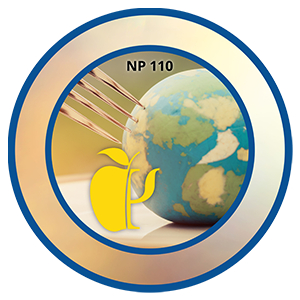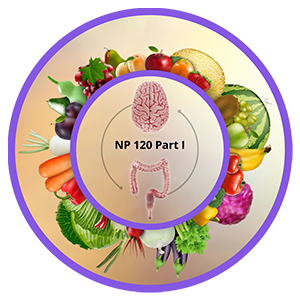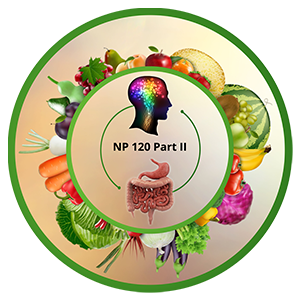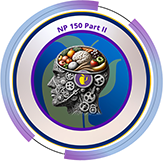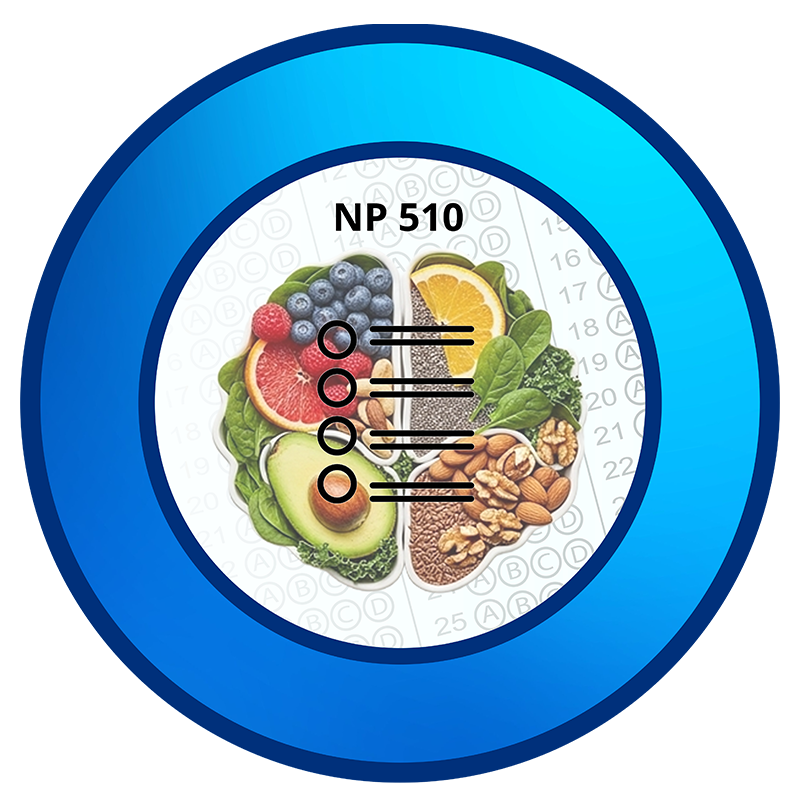NUTRITIONAL PSYCHOLOGY EDUCATION
What are the Nutritional Psychology Courses?
CNP offers many continuing education courses for professionals, students, educators, and anyone interested in learning more about nutritional psychology.
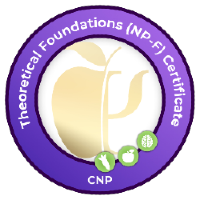 Certificate 1
Certificate 1
Course Prerequisites: None.
Course Description: NP 110 introduces the conceptual frameworks, methods, and language of Nutritional Psychology (NP). Central to this course is the introduction of the six primary relationships within NP: the diet-psychological, diet-behavioral, diet-cognitive, diet-interoceptive, diet-sensory-perceptual, and diet-psychosocial relationships. It also introduces the primary dietary patterns used in nutritional psychology research, including the Mediterranean Diet, DASH diet, MIND diet, AHEI, DII, and Ketogenic diets.
Studies revealing the intricate relationships between diet, psychological processes, human functioning, and lived experience are systematically identified, summarized, and organized by the CNP Team and placed within The Nutritional Psychology Research Library (NPRL).
From this growing body of evidence, the language, conceptual frameworks, and methodological approaches that advance our understanding of how dietary choices influence psychological states, and conversely, how psychological states shape nutritional choices and preferences, emerge. Through this course, learners develop a strong foundation in NP. They gain the ability to understand NP’s core principles and language, examine seminal research demonstrating the Diet-Mental Health Relationship (DMHR), and be prepared to critically assess the practical applications and limitations of this knowledge within clinical and educational contexts. By integrating these insights, learners are better prepared to support psychological health and well-being through both informed dietary choices and evidence-based practices.
Course Flyer: APA/CDR/NBCC and CAMFT.
Certificate Bundle: This course is part of Certificate #1, the Theoretical Foundations Certificate (NP-F), which includes NP 310 and NP 320. Purchase the NP-F Certificate bundle here.
Course Prerequisites: NP 110
Course Description: Explore the major psychological theories, models, and frameworks that underlie the emerging field of nutritional psychology. Core domains of inquiry include personality, motivation, emotion, cultural influences, attachment, and behavior change, all of which influence our understanding of how dietary factors impact psychological health and well-being and can support the development of real-world interventions in eating behavior, mental health, and dietary behavior change.
By integrating the theoretical basis of nutritional psychology within the psychological sciences, this course provides a robust theoretical foundation for the discipline, situated in the psychological sciences yet interdisciplinary with the nutritional sciences.
Learners will develop the capacity to critically evaluate how psychological constructs shape dietary patterns, mental health outcomes, and behavior change processes.
Course Flyer: APA/CDR/NBCC and CAMFT.
Certificate Bundle: This course is part of Certificate #1, Theoretical Foundations in Nutritional Psychology (NP-F), along with NP 110 and NP 320. Purchase the NP-F Certificate bundle here.
Course Prerequisites: NP 310
Course Description: This course explores the complex brain mechanisms that influence why we eat beyond simple hunger or recommended dietary patterns, framed within the interdisciplinary field of Nutritional Psychology. It begins by exploring the dual-system model, which contrasts homeostatic eating (for energy balance) with hedonic eating (for pleasure), and how these sometimes conflicting drives interact with internal signals, emotions, and environmental cues. Moving beyond this binary view, the course incorporates higher cognitive functions such as memory and impulse control, illustrating how these mental processes intertwine with biological systems to shape eating behaviors.
The heart of the course lies in introducing the five core neurobiological mechanisms that govern eating behavior. These include associative learning and habit formation, which make environmental food cues potent triggers; the dopamine-driven reward system that can escalate compulsive eating as it adapts to highly palatable foods; and the cognitive control networks in the prefrontal cortex, responsible for decision-making and self-regulation, which can be compromised by stress and hormonal imbalances.
Additionally, we examine how the gut-brain axis influences microbial and hormonal signals to shape appetite and food preferences, as well as the role of neuroinflammation in disrupting the brain’s regulation of hunger, reward, and emotion, which may contribute to unhealthy eating cycles. Taken together, the course reframes eating behavior as the product of dynamic interactions among brain systems shaped by genetics, experience, and environment rather than mere willpower.
Grounding Nutritional Psychology in the neurobiological sciences, it equips learners to understand how intertwined factors, such as reward sensitivity, interoception, cognition, memory, stress, and inflammation, impact food choices. This comprehensive perspective advances personalized approaches to nutrition and behavioral change within the behavioral sciences, aligning with the core mission of decoding brain-behavior relationships to improve mental health and dietary outcomes.
Course Flyer: APA/CDR/NBCC or CAMFT.
Certificate Bundle: This course is part of Certificate #1, Theoretical Foundations in Nutritional Psychology (NP-F), along with NP 110 and NP 310. Purchase the NP-F Certificate bundle here.
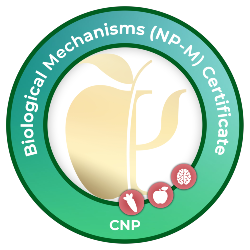 Certificate 2
Certificate 2
Course Prerequisites: NP 110 is highly recommended.
Course Description: NP 120 Part I prepares you with the knowledge necessary to enroll in NP 120 Part II, which provides the first evidence-based conceptual model directly connecting the Microbiota-Gut-Brain Axis (MGBA) with the Diet-Mental Health Relationship (DMHR).
This course introduces the MGBA and its major systems, including the gastrointestinal system (GI), central nervous system (CNS), peripheral nervous system (PNS), autonomic nervous system (ANS), neuroendocrine system (NE), enteric nervous system (ENS), the immune system, the vagus nerve, and the microbiota.
The historical discoveries illuminating the MGBA’s existence are explored, the primary methods used within MGBA research are reviewed, and an in-depth discussion of microbiota is presented, including its characterization, evolution, and the major factors shaping its unique composition, abundance, and diversity.
We explore the anatomy and physiology of the gut barrier, examining how it protects the gastrointestinal tract, internal organs, brain, and circulatory system from harmful bacteria and toxins. We learn how a weakened gut barrier increases intestinal permeability (or “leaky gut“), which sets the stage for influencing brain function, psychological processes, and mental health outcomes. The intricate structural and biochemical communication pathways linking the microbiota with the gut and the brain are presented to make way for the conceptual model presented in NP 120 Part II.
Course Flyer: APA/CDR/NBCC and CAMFT.
Certificate bundle: This course is part of Certificate #2, the Biological Mechanisms Certificate (NP-M), which includes NP 120 Part II and NP 150 Parts I & II. Purchase the NP-F Certificate bundle here.
Course Prerequisites: NP 120 Part I
Course Description: This course deepens the study of the mechanisms interconnecting the microbiota-gut-brain axis with the diet-mental health relationship (MGBA-DMHR) from NP 120 Part I. We begin with the exploration of how certain foods contain keys to unlocking the mechanisms within the MGBA-DMHR, and in doing so, influence and shape our moods, emotions, psychological experience, social functioning, and dietary intake behavior.
You’ll gain knowledge of the major MGBA-DMHR mechanisms, including myelination, synaptogenesis, neural plasticity, neurogenesis, hormones, neuropeptides, gut peptides, short-chain fatty acids, BDNF, and the guardians of the brain—the mighty microglia. These mechanisms operate within an intricate symphony to orchestrate and influence our psychological states, moods and emotions, social behavior, stress experience, resilience, cognitive processes, dietary intake behaviors, and mental health outcomes. By the end of this two-part series, you’ll understand the intimate role these mechanisms play in the development of psychological, psychiatric, neurodevelopmental, and neurodegenerative diseases.
This course provides professionals with a complete conceptual model through which to understand how the microbiota-gut-brain axis interconnects with dietary intake patterns to influence all aspects of the diet-mental health relationship.
Course Flyer: APA/CDR/NBCC and CAMFT.
Certificate Bundle: This course is part of Certificate #2, Biological Mechanisms Certificate (NP-M), which includes NP 120 Part II, and NP 150 Parts I & II. Purchase the NP-M Certificate bundle here.
Course Prerequisites: None
Course Description: NP 150 Part I deepens our understanding of the biological mechanisms influencing the diet-mental health relationship (DMHR) beyond the microbiota-gut-brain axis. In the context of DMHR, a mechanism refers to the detailed series of events or processes at the molecular, cellular, or physiological level enacted through dietary intake. These processes involve complex biochemical pathways, molecular interactions, and cellular processes that collectively influence our mood, cognition, and behavior, and thereby contribute to our overall functioning and mental health.
Mechanisms explored in this course include macronutrients, micronutrients, nutritional deficiencies, phytonutrients, and neuroactive compounds. Topics include dietary patterns, the microbiota-gut-brain axis, early life nutrition, hormonal regulation, and neuroendocrine pathways.
Key brain structures, including the amygdala, hippocampus, prefrontal cortex, hypothalamus, and striatum, are analyzed in relation to emotions, memory, decision-making, appetite, and food-seeking behaviors. The course covers the impact of dietary patterns on neurotransmitters, neurogenesis, neural repair, neuroplasticity, neurotrophins, neuropeptides, and neuroinflammation.
Additionally, we investigate how dietary patterns and specific nutrients affect immune-brain communication, inflammation, oxidative stress, microglial function, mitochondrial function, and the blood-brain barrier. These insights are examined in the context of their effects on psychological functioning and clinical mental health disorders.
Course Flyer: APA/CDR/NBCC and CAMFT.
Certificate Bundle: This course is part of Certificate #2, Biological Mechanisms Certificate (NP-M), which includes NP 120 Parts I & II, and NP 150 Part II. Purchase the NP-M Certificate bundle here.
Course Prerequisites: NP 150 Part I
Course Description: This course examines the physiological, psychological, behavioral, social, and environmental factors that influence DMHR. Building upon NP 150 Part 1, Learners gain insight into how stress, immune function, emotional and cognitive patterns, social contexts, and environmental factors dynamically interact within the diet-mental health relationship to influence eating behaviors, psychological experiences, and brain and mental health outcomes.
We begin by exploring psychoneuroimmunology, highlighting the interactions between dietary patterns, stress, the nervous system, and immune responses, as well as the impact of these interactions on mental health experiences and outcomes. We investigate stress as both a physiological and psychological response, focusing on how early-life stress influences dietary choices and mental well-being, as well as the bidirectional relationship between stress and eating behaviors.
We then gain insight into the psychological and behavioral mechanisms that shape our relationship with food, focusing on how emotions, cognition, and habits influence dietary choices and mental well-being. We focus on emotional eating, body image, cognitive distortions, mindfulness, and how habit formation, reward systems, and psychological dynamics, such as food noise and food addiction, impact eating behaviors.
The final module examines the social and environmental factors influencing the relationship between diet, mental health, and resilience (DMHR), moving beyond individual mechanisms to focus on broader contexts. It examines the impact of socioeconomic factors, cultural influences, social support, food environments, and urbanization on dietary choices and mental health outcomes.
Course Flyer: APA/CDR/NBCC and CAMFT.
Certificate Bundle: This course is part of Certificate #2, Biological Mechanisms Certificate (NP-M), which includes NP 120, Parts I & II, and NP 150, Part I. Purchase the NP-M Certificate bundle here.
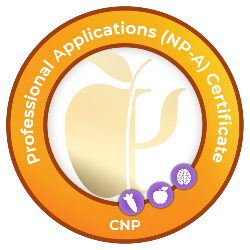 Certificate 3
Certificate 3
This course will be available in Fall 2026.
This course will be available in Fall 2026.
This course will be available in Winter 2026.
This course will be available in Fall 2026.
Why Complete Our Nutritional Psychology Courses?
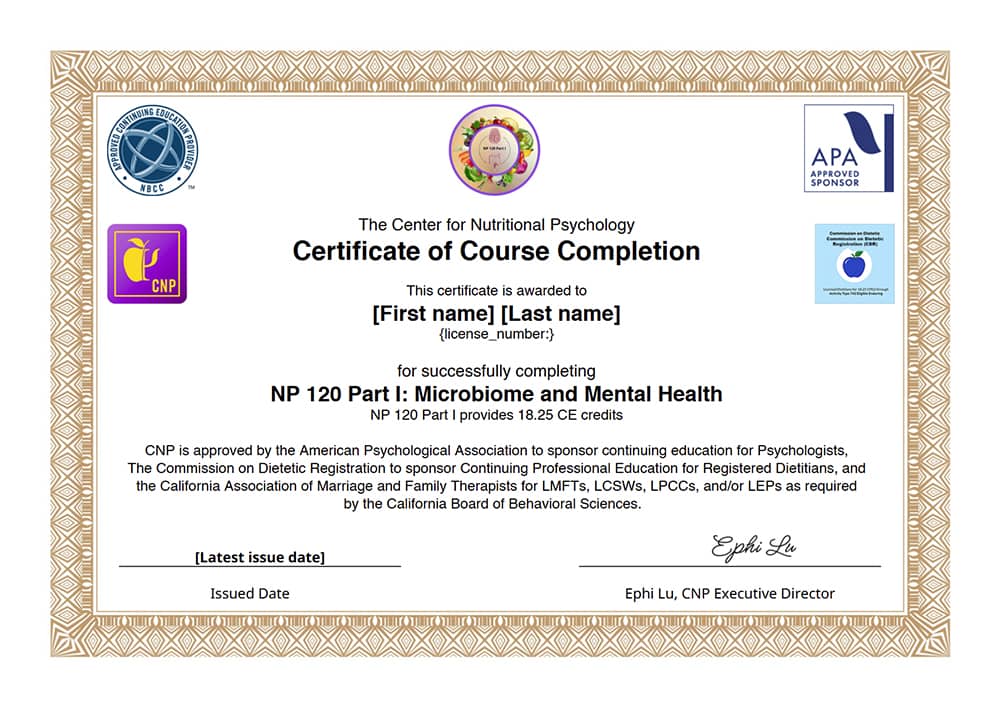
Few university-level education programs in mental health, nutrition, and allied health sciences offer formal education that integrates the psychological and nutritional sciences. Providers in these disciplines often lack formal, systematic, and evidence-based education and professional training on the bidirectional interconnections between nutrition and mental health and well-being. CNP fills this gap by providing licensed professionals in these fields with approved continuing education to equip them with a modern-day understanding of factors influencing mental health.
Professionals in these fields, along with students and educators, can receive Continuing Education either through individual courses, groups of courses culminating in certificates in thematic areas (theoretical, biological mechanisms, applications), or through the Micro-Degree (NP-FMA) in Nutritional Psychology.
 Navigation
Navigation


